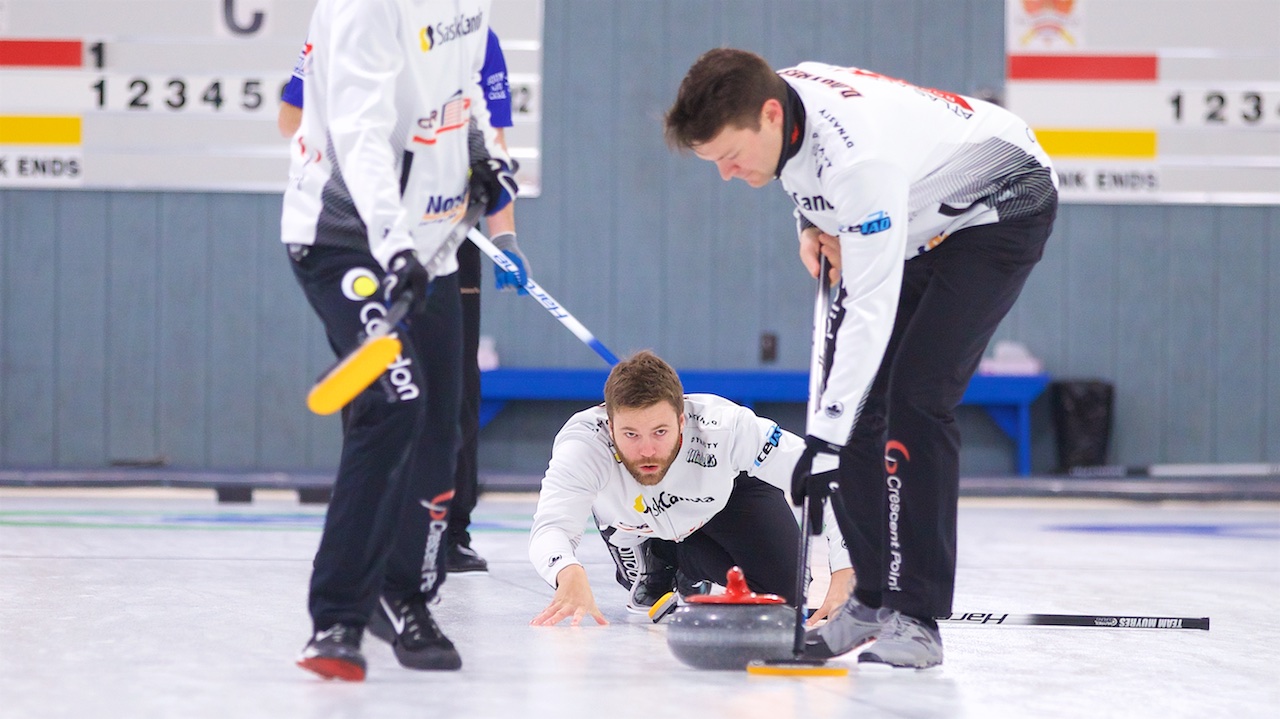How Tier 2 teams are moving up into elite ranks
THUNDER BAY, Ont. — So, you want to play in the Pinty’s Grand Slam of Curling?
It might seem like a lofty goal to join the world’s best but it’s possible to crack the elite field.
Look no further than Team Gunnlaugson, who put in the work and captured the Tour Challenge Tier 2 title a year ago to earn their promotion. The foursome from Morris, Man., have stayed put among the top flight of teams and have proven they belong qualifying for the playoffs at five Pinty’s Grand Slam of Curling events last season.
“They won the Tier 2, took off and put together a good 10-12 months of curling,” skip Matt Dunstone said. “Clearly, they’re in all the Slams. That’s kind of what we’re hoping we can do.”
The two-time Canadian junior champion Dunstone and his Regina-based team opened this season ranked 18th on the World Curling Tour’s Order of Merit. That placed them just on the outside looking in, however, they managed to bypass the Tier 2 process altogether thanks to a hot start that bumped them up to 12th this week.
For 15 men’s teams and 15 women’s teams though, Team Gunnlaugson’s blueprint is the one they’re looking to follow this week at the Tour Challenge. Winners of the Tier 2 division receive invitations to compete in the 2019 Meridian Canadian Open against the top teams in the world.
Saskatoon’s Team Muyres, currently ranked 21st in the world, is one such club targeting the Tier 2 title as the ticket to the top but have also done a ton of work behind the scenes to prepare for their path. The foundation begins with a solid foursome, which is what skip Kirk Muyres was aiming for when he formed his new team this season with his brother, Dallan Muyres, at lead plus twins Daniel and Kevin Marsh at second and third, respectively.
“I think it’s always been similar and it’s guys you get along with, guys you enjoy having around and then obviously, guys that make a lot of shots,” Muyres said. “Dallan and I have known Kevin and Dan since we were about 15 and we’ve always been friends. It was a fun idea to get together with them knowing we’d have fun on the road, be honest with each other and create a really good team. That was the biggest thing for us and it’s slowly coming together now. It’s not the easiest thing in the world to build a new team but slowly and surely we’ll get there.”
Once the team was assembled, the next step for Muyres was actually a two-parter as he planned his team’s schedule while also searching for sponsors.
“We know we want to become one of the better teams in the world and to do that we know we’ve got to play a schedule that allows that,” Muyres said. “The schedule we knew we were going to go play and (we had to) just make sure we have to find the funds to do it.
“We’re lucky to have a lot of good sponsors that allow us to do it. If you don’t have that then it becomes pretty tense on the road. There were some times over the summer when we didn’t even know if we’d have that but we’ve been blessed to have the support that we have with the companies back home that allow us to travel to play in the events we need to get better, to get into the Slams and to continue to rise up the rankings.”
It didn’t come easy for Dunstone either who said his team approached over 40 companies for sponsorship.
“Guys have been going to work just sending e-mails left, right and centre,” Dunstone said during the StuSells Oakville Tankard in September. “Some people get back to you and some people don’t. You’ve got to be on them a little bit to follow up but it’s always rewarding. It almost feels like you win a spiel when a company decides they want to partner with you because to have that extra money in your pocket when you go out and play in these events is huge. We’ve been here (in Oakville) for 10 days now and it could cost us anywhere from eight to 10 grand for the week. It’s such a huge part of the game.”
Dunstone suggests teams look to sponsors they can benefit from in other ways. His team landed Holiday Inn, which comes in handy when they need to book rooms for long stretches of time on the road.
“They’re such a huge help to give us rooms and everything on top of that. That’s a big one to have,” he said. “I’ve got my grandpa, his company, to help pay for a couple flights. It’s little things like that go such a long way for us.”
Considering they set the path, how did Team Gunnlaugson put their schedule together?
“I think moving up as a team it’s important to realize where you are in regards to the field and the World Curling Tour rankings,” Team Gunnlaugson lead Connor Njegovan said. “Playing all of the hardest events right off of the get-go is really tough to do and there are a lot of really great curlers, so we pick and choose events we thought we could do really well in and then we just challenged ourselves as we kept meeting our goals to increasing them and going into harder and harder events.”
Practice makes perfect, as they say and Team Muyres hit the ice every day for about an hour with their skip himself clocking in extra time.
“I like to go for about an hour by myself, just get that technique down and hammer that in,” Muyres said. “With the team, we like to get three to four hours of practice in a week, maybe a little more if we can depending on what’s coming up and when we play. I always think if you’ve got time, go and get better at curling. There are a lot of things you can do. You can go to the gym, you can go work with psychologists and go work with nutritionists, that’s very important too but at the end of the day you have to be really good at curling so take your time on the ice and that’s kind of what I hang my hat on.”
Njegovan stressed the importance of practice saying altogether curling is a full-time gig.
“We’re on the ice all of the time and practising together all of the time,” Njegovan said. “The difference between a No. 1 team in the world and a No. 10 team in the world right now is so small and it’s the little things that you do when you’re not in a curling club full of athletes and you’re by yourself, that’s going to be biggest difference.”
It all comes down to points though. Teams still have to win games in order to move up the rankings and get into (or maintain) their spot among the elite.
“You’ve got to win a lot games early and win a lot of games over the season to be good,” Muyres said. “Figure out a way to win. I don’t care if you play 50 percent and win the game or play 90 percent and lose, I’m taking the guy that plays 50 percent and wins.”
Team Dunstone hit the road this season early and often and it has paid off with the squad picking title victories in Vernon, B.C., and Morris, Man., and qualifying for the playoffs in four other events that enabled them to move into the top tier.
“At the end of the day, you can look at points all you want but if you don’t win you’re not going to get them,” Dunstone said. “That’s what it’s all about is to get some wins and lucky for us we’ve been on the right side of the inch these last couple weeks. We’re in a good spot so far.”

